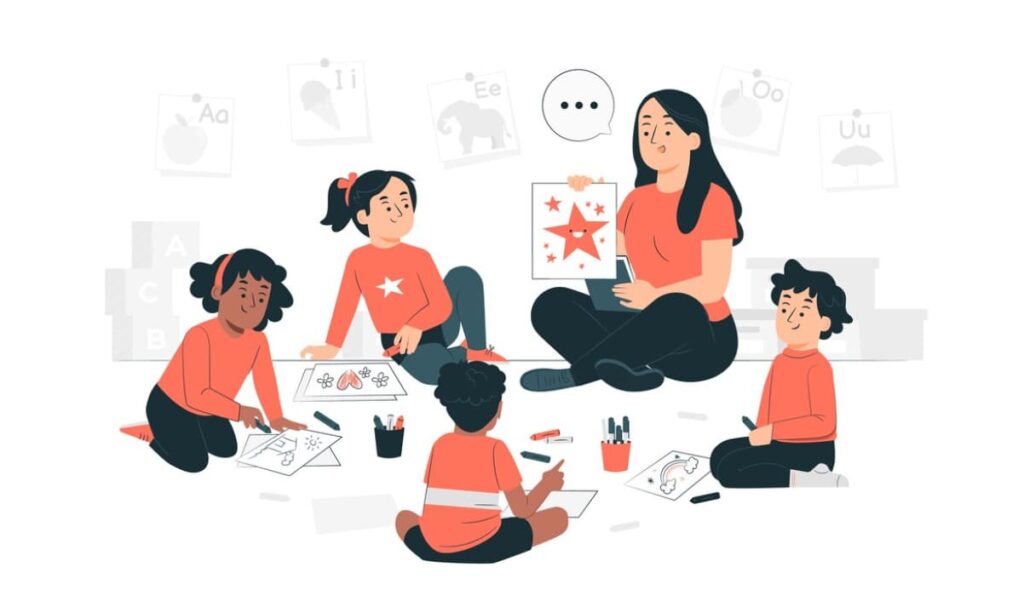As per data from the North Carolina Department of Commerce, in 2012, there were 15,110 licensed preschool teachers in the state. Projections indicate that by 2020, this number is expected to rise to 16,660, creating approximately 160 new early childhood education job opportunities annually in North Carolina. While the process of becoming a kindergarten teacher in NC may vary from that of obtaining early childhood certification in New York, both paths involve essential steps to prepare educators for the crucial role of nurturing young minds in their early years of education.
To become a licensed preschool teacher in North Carolina, you need to successfully complete the following steps:
- Obtain a Degree in Early Childhood Education;
- Apply for a Standard Professional 1 (SP1) Professional Educator’s License;
- Progress to a Standard Professional 2 (SP2) Professional Educator’s License;
- Maintain your Standard Professional 2 License.
North Carolina’s Pre-K Program operates under the Division of Child Development and Early Education, a part of the North Carolina Department of Health and Human Services. This program is designed to provide high-quality educational experiences that enhance school readiness for eligible four-year-olds. It is based on five developmental domains, as outlined by the National Education Goals Panel:
- Learning Approaches;
- Emotional and Social Development;
- Health and Physical Development;
- Language Development and Communication;
- Cognitive Development.
The Pre-K Program is intended for various providers of pre-kindergarten services, including local school boards, private child care providers, and other organizations.
To work as a preschool teacher in a public school setting, you must hold a birth-kindergarten (B-K) teacher license issued by the North Carolina Department of Public Instruction. Additionally, if you are employed by a Head Start or infant/toddler program, you may also need a B-K license in North Carolina. The North Carolina B-K license is a comprehensive teaching credential that focuses on children with developmental delays and those who are developing typically.
Step 1: Obtain a Degree in Early Childhood Education
If your goal is to become a licensed preschool teacher in North Carolina, you’ll need to start by completing a teacher preparation program. In the state, there are currently 31 B-K (Birth-Kindergarten) preparation programs available, with 24 at the bachelor’s degree level and 9 at the master’s degree level.
While the minimum degree requirement for teaching in North Carolina is a bachelor’s degree, you can also opt for a master’s degree program if you already have a bachelor’s degree but haven’t completed a teacher preparation program or obtained licensure for preschool teaching.
In North Carolina, a B-K teacher preparation program equips you to teach infants, toddlers, preschoolers, and kindergartners, including those with and without developmental disabilities. After completing all the required coursework, you’ll need to undertake a full-time student teaching experience.
To be eligible for initial licensure in North Carolina through the North Carolina Department of Public Instruction, you must receive a recommendation from the college or university where you completed your teacher preparation program.
For those interested in teaching preschool in a non-public school setting, such as private child care or pre-K private schools, you must meet the following criteria:
- Possess at least a bachelor’s degree in early childhood education, child development, or a related field such as human development and family studies, elementary education, or psychology;
- Be “working toward” a B-K license or be eligible for a North Carolina Initial Provisional Lateral Entry B-K license. Progress toward a B-K or preschool add-on license is acceptable if you complete a minimum of 6 semester hours per year. Additionally, you must obtain the B-K license within 3 years;
- You may also qualify if you currently hold a North Carolina K-6 license and a provisional Preschool Add-On License.
Preschool educators working in non-public settings must be enrolled with the Early Educator Support, Licensure, and Professional Development Unit of the Division of Child Development and Early Education, under the Department of Health and Human Services.
Step 2: SP1 Professional Educator’s License Application

After receiving a recommendation from the institution where you completed your teacher preparation program, the subsequent phase involves applying for a Standard Professional 1 (SP1) Professional Educator’s license.
The SP1 license holds a validity period of three years, during which you must accumulate a minimum of three years of professional teaching experience. While no specific content test is required to obtain a B-K (Birth-Kindergarten) license, there exists an opportunity to attain a “highly qualified” status for kindergarten teaching by successfully completing the PRAXIS Early Childhood: Content Knowledge (5025) examination, achieving a score of at least 155.
For detailed information regarding the scheduling and administration of the PRAXIS examination, you can consult the ETS website, which serves as the designated administrator for PRAXIS examinations.
This step represents a pivotal moment in your pursuit of becoming a licensed preschool teacher in North Carolina, propelling you closer to realizing your aspirations in the teaching profession.
Step 3: SP2 Educator’s License Application
Once you have gained at least three years of professional teaching experience, you become eligible to apply for an SP2 license, which permits you to teach preschool in North Carolina. If you aim to attain a “highly qualified” status for teaching kindergarten, it’s crucial to send your PRAXIS test scores directly to the North Carolina Department of Public Instruction. Additionally, you must complete and submit the Verification of Highly Qualified Status form as part of your application process. This step marks a significant milestone in your path towards becoming a licensed preschool teacher in North Carolina.
Step 4: Sustain Your Standard Professional 2 License
To ensure the continued validity of your Standard Professional 2 (SP2) license for preschool teaching in North Carolina, it’s essential to fulfill the requirement of earning a minimum of 7.5 renewal credits. These renewal credits should cover the following areas:
- At least 1 renewal credit dedicated to literacy;
- At least 1 renewal credit specifically focused on early childhood education;
- A minimum of 5.5 general credits, which should align with your employer’s criteria and guidelines.
It’s worth noting that the measurement of renewal credits in North Carolina is standardized, with one unit of renewal credit equating to either a quarter hour or one in-service credit earned through a North Carolina public school system. Each unit corresponds to 10 contact hours of professional development activities. Maintaining these renewal credits is crucial for preserving the status of your SP2 license, ensuring you remain qualified to teach preschool in North Carolina.
Activities eligible for renewal credit may include:
- College or university courses;
- Local in-service courses or workshops;
- Classes and workshops approved by a Local Education Agency (LEA).
By fulfilling these renewal credit requirements, you can effectively maintain your SP2 teaching license, ensuring your continued ability to shape the educational experiences of preschool children in North Carolina.
Preschool Teacher Salaries in North Carolina

According to data from the U.S. Bureau of Labor Statistics in 2012, preschool teacher salaries in North Carolina exhibited the following figures:
| Statistic | Salary Amount |
|---|---|
| Total number of preschool teachers | $11,300 |
| Annual mean salary | $25,530 |
| Annual median salary | $23,760 |
| Hourly mean wage | $12.27 |
| Hourly median wage | $11.43 |
| Average annual salary among the top 10% | $36,820 |
It’s worth noting that salary disparities exist based on geographical location. For instance, Rocky Mount, an artistic community along the coast, boasts the highest preschool teacher salaries. Conversely, Charlotte (North Carolina’s largest city) and Raleigh (the state capital) fall within the middle range of preschool teacher salaries.
Early childhood education has emerged as a promising career field in the United States. The National Association for the Education of Young People emphasizes the profound impact of quality preschool programs on a child’s cognitive and social development. The quality of preschool programs hinges on the quality of its teachers, which is determined by their ability to effectively communicate with young children and their educational qualifications.
A spokesperson from the North Carolina Institute for Child Development Professionals affirmed, “Research underscores the significance of teacher education levels in influencing child outcomes.” North Carolina boasts 64 schools offering accredited early childhood education programs at various academic levels, including associate, bachelor’s, master’s, and doctoral degrees.
As of 2013, the U.S. Department of Labor provides salary information for early childhood educators in North Carolina’s major cities, offering further insights into this vital aspect of the field.
Conclusion
Becoming a licensed preschool teacher in North Carolina is a journey that involves a comprehensive educational path and a series of licensures. The process, albeit rigorous, is designed to equip you with the necessary skills and knowledge to shape the minds and hearts of the young generation effectively. As we anticipate a surge in the demand for early childhood educators in North Carolina, now is the opportune time to embark on this rewarding career path. With the robust support system from the state’s departments and the promise of competitive salaries, a career in early childhood education in North Carolina holds immense potential for those passionate about nurturing the future generation.